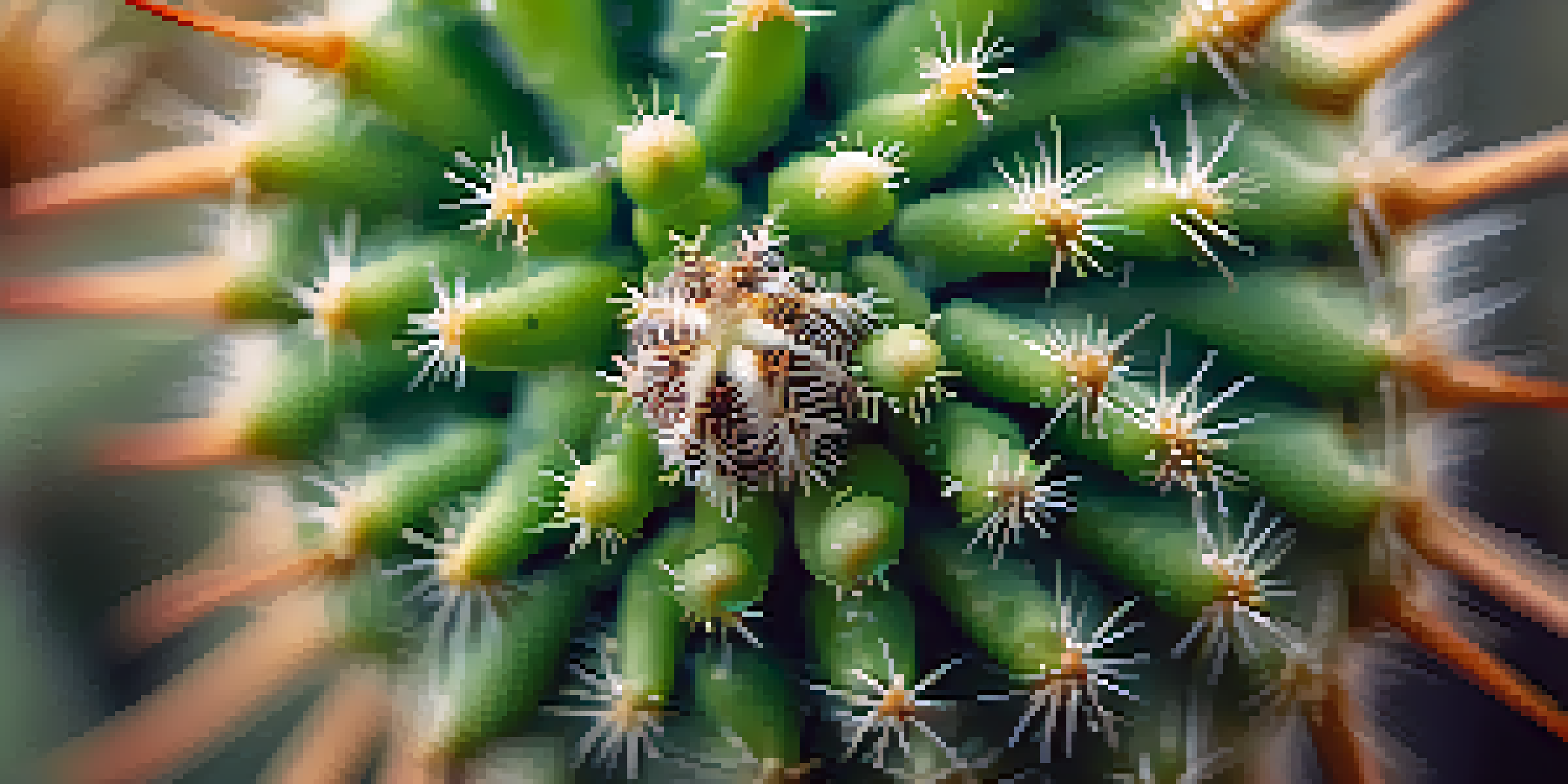Peyote and the Nature of Reality: A Philosophical Inquiry

Understanding Peyote: A Brief Overview
Peyote, a small cactus native to Mexico and the southwestern United States, has been used for centuries by indigenous peoples for its psychoactive properties. This cactus contains mescaline, a compound that alters perception and consciousness. Understanding peyote is not just about its chemical components; it's about its cultural and spiritual significance, especially among Native American tribes.
The experience of the psychedelic state is an experience of seeing the world differently, an experience of new perspectives on reality.
For these tribes, peyote is more than a hallucinogen; it's a sacrosanct tool for spiritual healing and connection to the divine. They use it in rituals to seek visions, understand their place in the universe, and foster a deep sense of community. This rich history invites us to consider how such experiences might inform our understanding of reality itself.
As we delve into the philosophical implications of peyote use, we begin to question our own perceptions and the nature of reality. What does it mean to experience the world through a different lens? This inquiry sets the stage for a deeper exploration of consciousness and existence.
The Nature of Reality: Philosophical Perspectives
Philosophers have long debated the nature of reality, with various schools of thought offering different interpretations. Some, like idealists, argue that reality is fundamentally mental, while materialists insist that it is grounded in the physical world. By examining these perspectives, we can better understand how experiences, such as those induced by peyote, challenge our conventional notions of what is real.

For instance, the concept of solipsism suggests that only one's mind is sure to exist, raising questions about shared realities. When individuals experience altered states of consciousness through peyote, they often report feelings of oneness and interconnectedness, which can challenge the idea of isolated individual realities. This suggests that perhaps reality is more fluid and subjective than we typically acknowledge.
Peyote's Cultural Significance
Peyote is not just a hallucinogen; it serves as a sacred tool for spiritual healing and community connection among Native American tribes.
Additionally, phenomenology, a school of thought that focuses on subjective experiences, emphasizes how our perceptions shape our understanding of reality. By exploring peyote's effects, we can gain insight into how altered states might expand or contract our perception of existence, leading to new philosophical inquiries about the nature of being.
Altered States of Consciousness Explained
Altered states of consciousness (ASC) are shifts in awareness that can occur through various means, including meditation, fasting, and, of course, substances like peyote. These states can provide profound insights or transformative experiences that challenge our day-to-day perceptions. Understanding ASCs helps us appreciate the potential of peyote to unlock different aspects of reality.
Psychedelics teach us that we are not separate from the universe, but rather a part of it—a vital thread in the tapestry of existence.
During these altered states, individuals often report vivid imagery, feelings of unity with the universe, and even encounters with what they perceive as higher powers. These experiences can lead to significant shifts in worldview, prompting introspection about life, existence, and personal identity. The richness of these experiences raises important questions about the limits of human perception.
Furthermore, ASCs can be therapeutic, offering unique pathways for self-discovery and healing. In controlled settings, the use of peyote and other psychedelics has shown promise in treating mental health issues, suggesting that these altered perceptions can lead to meaningful changes in how we understand ourselves and our reality.
Psychedelics and the Philosophy of Mind
The philosophy of mind seeks to understand the nature of consciousness and its relationship to the body. Psychedelics, including peyote, challenge traditional views by suggesting that consciousness might not be solely a product of brain activity. This raises intriguing questions about the essence of the mind and its connection to external reality.
Some theorists propose that psychedelics can provide insights into the non-ordinary states of consciousness that exist beyond everyday awareness. When individuals consume peyote, they often report experiences that feel 'realer than real,' suggesting that these substances can bridge the gap between subjective experience and objective reality. This notion invites us to rethink the boundaries of our understanding.
Philosophical Questions of Reality
The use of peyote challenges conventional perceptions of reality, prompting inquiries into consciousness and shared experiences.
By examining how peyote influences perception, we might also explore concepts like panpsychism—the idea that consciousness exists in all things. This perspective aligns with many indigenous beliefs about the interconnectedness of life, providing a fascinating intersection between modern philosophy and ancient wisdom.
The Role of Culture in Shaping Reality
Culture plays a significant role in shaping our perceptions of reality, influencing everything from our beliefs to our experiences. The use of peyote is deeply embedded in the cultural practices of many Native American tribes, where it serves as a sacred tool for understanding the universe. This cultural context highlights how our experiences are often filtered through the lens of societal norms and values.
In contrast, Western perspectives on peyote have often focused on the substance as a mere drug, overlooking its cultural significance. This dichotomy suggests that our understanding of reality is not only subjective but also heavily influenced by cultural narratives. By examining these different viewpoints, we can appreciate the diverse ways that reality is constructed.
Moreover, the blending of cultural practices with personal experiences can lead to a richer understanding of existence. When individuals from different backgrounds engage with peyote, they may bring their own interpretations, leading to a tapestry of experiences that further complicate the idea of a singular reality.
Ethics and the Use of Peyote
The ethical considerations surrounding the use of peyote are multifaceted, involving questions of cultural appropriation, legality, and individual rights. As interest in psychedelics grows, discussions about who has the right to use these substances become increasingly important. Respecting the cultural origins of peyote is crucial to ensuring that its use is ethical and meaningful.
Cultural appropriation occurs when elements of one culture are taken by another, often without understanding or respect for their significance. This is particularly relevant for peyote, which holds deep spiritual importance for many indigenous peoples. Engaging with these traditions requires sensitivity and acknowledgment of their origins to avoid exploitation.
Ethical Considerations in Usage
The growing interest in peyote raises important ethical questions about cultural appropriation and the commodification of sacred practices.
Additionally, as more people seek out peyote for personal growth or healing, it raises questions about the commodification of sacred practices. It’s vital to approach these experiences with humility and respect, ensuring that we honor the cultural roots while navigating the complex landscape of personal and collective realities.
Conclusion: Expanding Our Understanding of Reality
The exploration of peyote and its philosophical implications opens a dialogue about the nature of reality. By engaging with altered states of consciousness, we can challenge our preconceived notions and discover new dimensions of existence. This journey invites us to consider not only what reality is but also how it can be perceived differently through various lenses.
As we reflect on the cultural, ethical, and philosophical aspects of peyote use, we are reminded of the interconnectedness of all things. Our understanding of reality is shaped by our experiences, beliefs, and the cultures we inhabit. Embracing this complexity can lead to a richer, more nuanced appreciation of life.

Ultimately, the inquiry into peyote and the nature of reality encourages us to remain open-minded and inquisitive. By exploring these profound questions, we can expand our consciousness and deepen our understanding of what it means to exist in this ever-changing world.